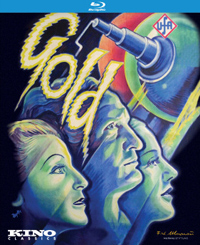 Fans of Fritz Lang’s eternally magnificent sci-fi epic Metropolis (1927) should find considerable enjoyment in the Austrian Karl Hartl’s overlooked 1934 talkie, Gold. A rare science fiction title made in National Socialist Germany, it plays with the same ideas of sordid spectacle in a capitalistic vacuum where privilege only begets murder and greed, suggesting science must also consider the moral ramifications of supposed ‘progress.’ Although less subversive and not quite as compelling as Lang’s previous masterpiece, of which this is certainly modeled after, it’s a ripe revenge melodrama replete with a surprising anxiety laden finale.
Fans of Fritz Lang’s eternally magnificent sci-fi epic Metropolis (1927) should find considerable enjoyment in the Austrian Karl Hartl’s overlooked 1934 talkie, Gold. A rare science fiction title made in National Socialist Germany, it plays with the same ideas of sordid spectacle in a capitalistic vacuum where privilege only begets murder and greed, suggesting science must also consider the moral ramifications of supposed ‘progress.’ Although less subversive and not quite as compelling as Lang’s previous masterpiece, of which this is certainly modeled after, it’s a ripe revenge melodrama replete with a surprising anxiety laden finale.
Professor Holk (Hans Alber) is on the verge of perfecting a new scientific technique in the development of atomic fracturing which would transform lead into gold. Developing this breaking technology with the help of his mentor, Professor Achenbach (Friedrich Kaysler), their achievement is thwarted by an act of sabotage which goes dangerously awry. With Achenbach dead, Holk is forced to accept funding to continue his research by a rich English businessman, John Wills (Michael Bohnen). Except, it turns out Wills was ultimately responsible for Achenbach’s demise, leading Holk to use the opportunity for vengeance, finding an unlikely ally in Wills’ sympathetic daughter (Brigitte Helm).
Information on Hartl’s affairs during Nazi controlled WWII Germany are rather vague (he did not defect like many of his more famed peers, such as Lang, and Billy Wilder, with whom he collaborated), but his directorial career more or less halted after named Director of Production for Wien-Film, which was maintained by UFA, Germany’s principal film studio controlled by Goebbels.
Resuming his career after the end of the war saw additional success for Hartl, whose 1956 film Mozart (his second project concerning the composer) competed at Cannes. Gold is very much in the vein of Lang’s more lavish productions, and parallels are enhanced by a supporting turn from Brigitte Helm as the rebellious daughter of the crooked English businessman.
Hans Albers, perhaps familiar as the Strongman in Von Sternberg’s gorgeous The Blue Angel (1930), also appeared in Hartl’s famed The Man Who Was Sherlock Holmes (1937) and an earlier sci-fi effort, F.P.1 Doesn’t Respond (1932), penned by Curt Siodmak. Here, he’s the heroic, morally centered protagonist who bears a striking resemblance to Peter Finch (which means he looks a bit gone-to-seed for his dual romances with Helm and a fiancée played by Lien Deyers). His quest for vengeance is understandable, but one wishes for a villain a bit more malevolent than the greedy conglomerate represented by Michael Bohnen.
The striking look of Gold is due in part to the contributions of art director Otto Hunte, who worked on Lang’s Metropolis and Dr. Mabuse the Gambler, as well as The Blue Angel and the rare German post WWII noir Murderers Are Among Us. The elaborate set designs are considerable, especially as regards the monolithic machinery located in John Wills’ secret undersea chamber, with ambitious special effects meant to relay the visualization of atomic fracturing.
Disc Review:
Kino Lorber includes this newly digitized transfer of the film under their Classics label, presented in 1.33:1. The title was photographed by three DPs (Gunther Rittau of Metropolis, Otto Baecker of F.P.1., and Werner Bohne), and visual and audio quality of this transfer is clear. A lack of any sort of extra features seems surprising considering the film’s particular strengths and historical interest.
Final Thoughts:
A superb spectacle from a fascinating period in German film history just prior to the industry’s toxic takeover, Gold may display obvious narrative intentions, but is enjoyable to behold.
Film Review: ★★★★/☆☆☆☆☆
Disc Review: ★★★½/☆☆☆☆☆


